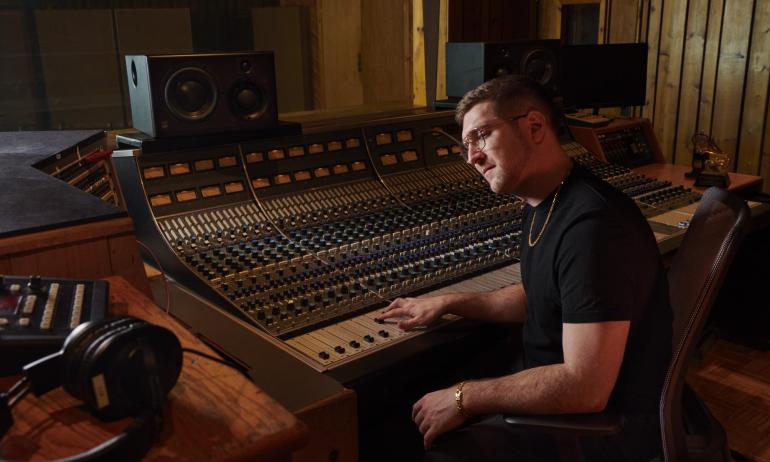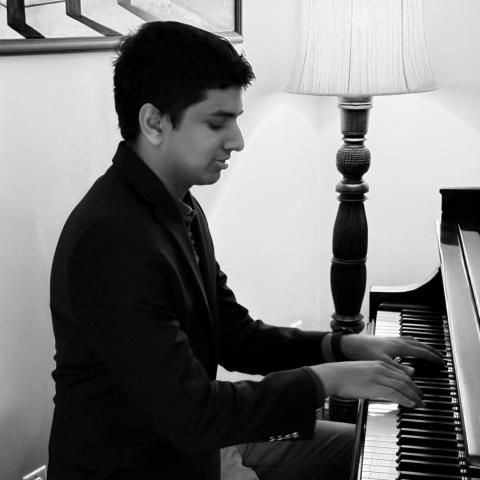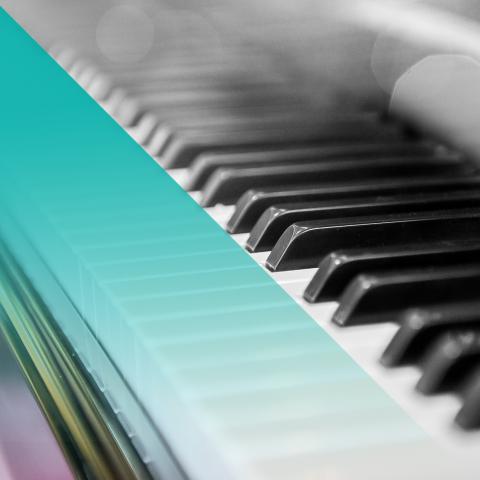How Musicians Can (and Should) Use AI—According to Berklee Experts

Illustration by Vanessa Rossi
It's no wonder the first event in Berklee's AI and Music Innovation Series was packed to the doors. For the students and faculty in attendance, all current and future music industry leaders, the stakes could not be higher—professionally, ethically, artistically. A year ago a large language model (LLM) couldn't tell you how many Rs are in the word "strawberry" and were scoring in the 60s on standard IQ tests. Now AI tools for musicians can write you ten versions of a song, generate the audio in ten different styles, master the audio, and write the press release, all with a few plain language prompts.
"It's a complicated, mixed bag of truly existential changes—negative threats and positive opportunities," said Berklee President Jim Lucchese, introducing the new speaker series, which will take place monthly beginning this fall. "It's really critical for everybody here . . . to all be as well informed in a very fast moving space as possible."
Yet contrary to the fear and pessimism that sometimes overshadows conversations about artificial intelligence and the arts, these 90 minutes were filled with the curiosity and pragmatic optimism of professional artists who've always found new ways to create with cutting edge tools.
"For the folks in this room," said Lucchese, "it's about understanding things well enough to focus on and create those positive opportunities."
The panel, moderated by Chris Wares, interim chair of the Music Business/Management Department, included Ben Camp, associate professor of songwriting; Lori Landay, professor of cultural studies; Jennifer Hruska, assistant chair of the Electronic Production and Design Department; and Jonathan Wyner, professor of music production and engineering. Among the panelists, no single viewpoint dominated. No one-AI-fits-all approach emerged. Instead, each speaker shared their own experiences teaching and creating with artificial intelligence tools, and invited the audience to define their own approach, guided by judgment, ethics, and personal taste.
Here are some of the conversation's key takeaways:
Your Taste Is Everything
Much of the conversation revolved around the importance of artists guiding the creative process when working with AI.
We’ve crossed a threshold where no creative task feels safely out of AI’s reach. Humans are already collaborating—and competing—with machine-generated content across every medium. So what do we carbon-based creators still bring to the table? Well, we know what we want. And we know what we like.
Camp described using a large language model to churn through dozens of lyric variations, refining and reshaping them based on their own instincts through generation after generation of prompts. “The reason I’m able to navigate these things so quickly is because I know what I want,” they said.
Wares illustrated a similar point with a real-world example: an AI might be able to write a decent press release, but only someone with a trained eye and industry insight knows what makes one truly work.
“If you don’t have that expertise, if you don’t have that training, that taste, it may seem like a beautifully written press release,” said Wares. “But then you hand it over to a publicist who has 10 years of experience . . . they’re gonna take a look at it and say, ‘Oh, no. This will never fly.’”
Or, as Camp put it: "If you don't have the taste to discern what's working and what's not working, you're gonna lose out to the people that do have the taste, because anybody can [use AI to write songs]."
AI can generate an infinity of beats—but only you can tell if they slap.
"Don't Skip the Steps"
If taste should guide our use of AI, then building the skills that form our taste is essential. "Don't skip the steps," as Wares said.
This advice was especially relevant to the students in the room, who might be tempted by AI's ease and accessibility to use it instead of developing their own skills. Camp put it bluntly: " If you have to learn how to write a song, don't have the GPT write a song for you."
But skill-building isn't just for beginners. "Everything is use it or lose it," Landay said. "You know what happens when you don't practice your instrument, right? . . . You start to lose it. And it's true of everything.
"If one thinks, 'Oh, I can outsource that to ChatGPT, I'm just gonna pop this PDF in the LLM, and it's going to summarize it for me,' you're going to lose something. And it's not just summarizing. It's these critical thinking and analyzing skills, and that's what it means to be human."
If you don't have the taste to discern what's working and what's not working, you're gonna lose out to the people that do have the taste.
—
And while not every human skill is worth keeping sharp, we need to be thoughtful about what we trade away, and what we build in its place.
" I used to be really proud of myself that I was able to remember phone numbers. I don't anymore. Do I need to be that? No," said Wyner. "But in order to move forward, what do you need to be practicing? There's a great deal of pleasure in letting go of things we don't need to be doing anymore. But ultimately that's got to be replaced . . . by something that is useful to you."
Refining, Not Replacing, Your Creative Process
Wyner has seen AI tools dramatically expand what's possible in audio engineering: " I could do things using AI I never could do before, and I can get better results." AI noise reduction software, for instance, makes it possible to record studio-quality audio almost anywhere. As he put it: "the world's your studio."
He shared a typical challenge from mastering sessions: "We sometimes will spend an hour or two just trafficking in compromises: I want to squeeze the chorus a little more to get some more energy, but the drums are now less energetic," he said. " I don't have to do that anymore. I can actually squeeze it a little bit. I can turn up the drums, I can reach into the mix and do something I never could do before. And everything is better."
But this only works if the engineer has "an understanding of what it is that's gonna make it compelling and beautiful."
In a different context, Camp uses AI not to finish songs, but to prototype ideas: “I’m thinking about writing a song with this concept," they might say to an LLM. "Give me 10 different iterations of verses. . . . That’s a cool snippet. That’s a nice pre-chorus. . . . Then I’ll take that pieced-together version, go back to the LLM and say, ‘Okay, this is the direction I’m thinking, but this line . . . this is wrong with it. The chorus needs more of a payoff.’ And I have it iterate.”
Then Camp might use an AI music generator to hear the sketch in musical form. “AI gives me a very quick way to hear back lyric ideas and whether they’re hitting or not.”
Think Like an Entrepreneur
AI is already reshaping and disrupting the creative economy—and for artists willing to engage with this new technology, it could open up new ways to lead.
"In my career . . . I've seen a number of so-called disruptive technologies come along. And for me, they've created a lot of opportunity," said Hruska, who founded and ran a music tech company before coming to Berklee. "In my experience, more growth comes from these things."
She encouraged students to embrace that mindset: " Remember that if you can't find a job, you have to make a job. . . . That's what artists do. And you're creative, so you already know how to make things."
If you can't find a job, you have to make a job. . . . That's what artists do.
—
Hruska explained that new technologies usually start by making existing processes more efficient. But then they start "doing new things—things you haven't already thought of."
"Look around and you say . . . 'What doesn't exist now that people kind of need?'" she suggested. "Then you go and you build those things. You provide those solutions, you provide those services, you provide those products. And that's being an entrepreneur."
Stefanie Henning, Berklee's associate vice president for career strategy and services, added that graduating students are likely to enter workplaces—whether recording studios or offices—whose systems and processes are outdated and inefficient. She said they can ask some entrepreneurially minded questions: "What can I improve here? What feels really archaic and very manual that can be automated using AI?"
" Knowing how to prompt it to optimize the workplace in a way that hasn't been done before," she said, "that's where your value is."
Protect Your Humanity
Learning to thrive in an industry landscape filled with tools like these, with more always on the horizon, is a chief concern for creative professionals. Learning to do so ethically, and to protect the personal spark that makes art worth making and consuming, is a chief concern for all humans.
"When we use AI, we have to develop our own ethics," said Landay, who recently taught a Liberal Arts course called AI, Artifice, and Responsibility. In the course, Landay encouraged her students to ask some basic questions about how they're using AI—questions such as, "What tool do you want to use? Why do you want to use it?" and, "Do you need AI [to perform this task]?"
She also stressed the importance of understanding how a particular AI tool is trained, and how it uses user data. And she proposed a kind of "golden rule" regarding AI training data: " If you would not want someone to use your work in the way that an AI tool is using other people's work, then you should seriously consider whether you think it is ethical to use that tool."
An AI simulation is never going to have what everyone in this room has, which is experiences over time in a body.
—
But amid all these technical and practical considerations, the panelists returned again and again to what is hardest for a machine to replicate or emulate.
"An AI simulation is never going to have what everyone in this room has, which is experiences over time in a body," said Landay. "How our perceptions of what we've experienced have changed based on where we are now versus where we are. Our imperfect memories. All of those things. And our emotional responses. And our relationships with each other. What it's like to be in a crowd, what it's like to be alone.
"These are the things that make us human, not machines, not a digital anything. This is what is precious. This is what makes art, this is what makes music. This is what makes us enjoy music, why we have to have music."




